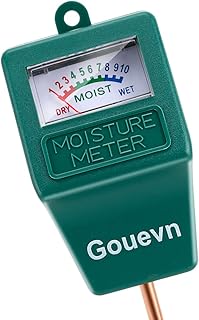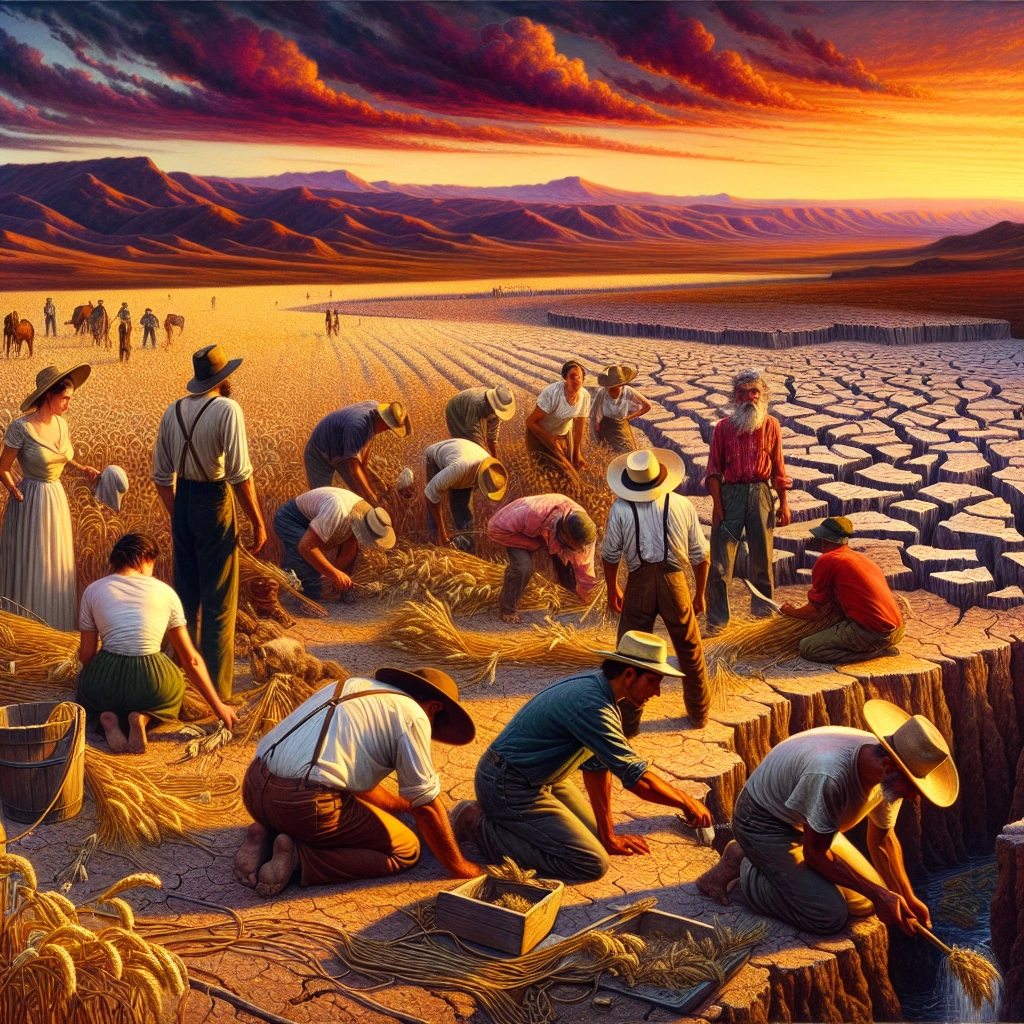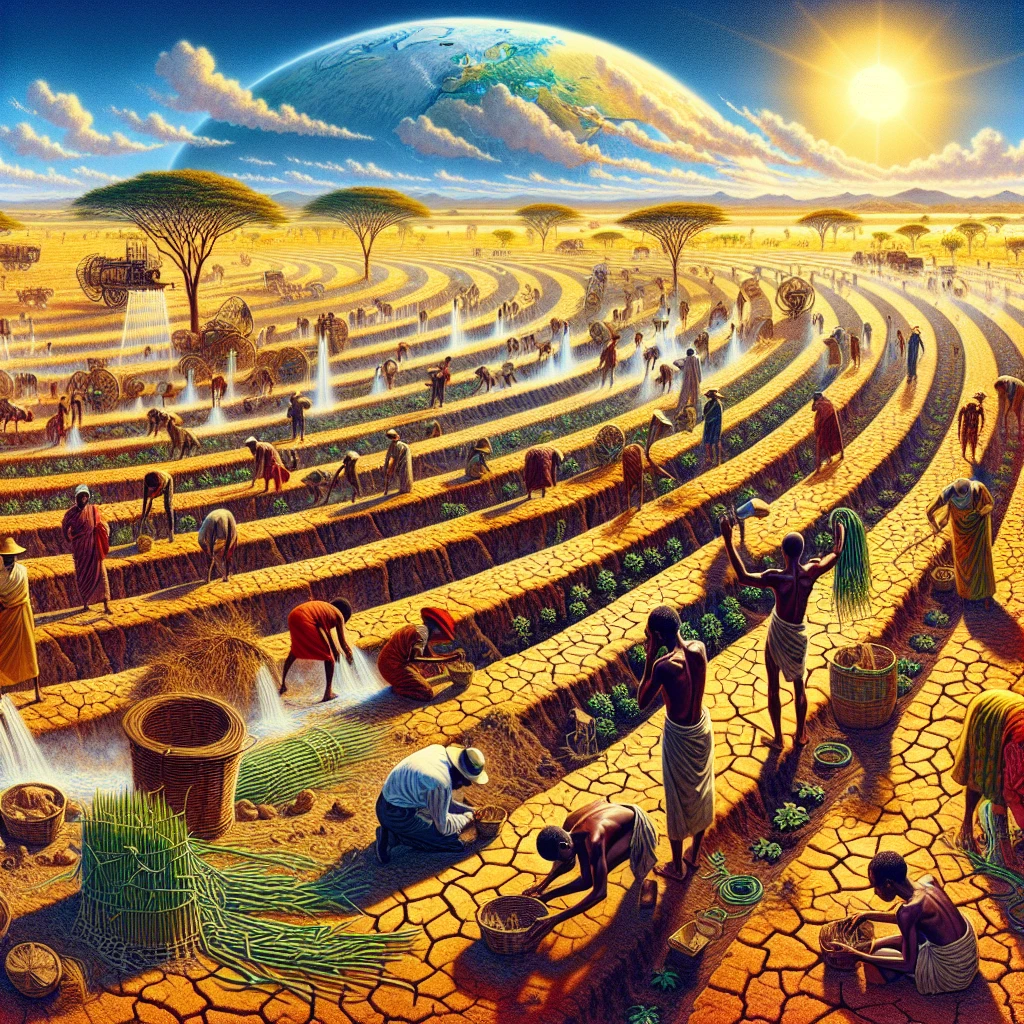

Climate change, defined as long-term shifts in temperatures and weather patterns, has a significant impact on food production in Africa. Agriculture is the most important economic activity in Africa, providing employment for the majority of the working population and contributing significantly to the continent’s gross domestic product and exports.
However, climate change is expected to lead to a decline in agricultural productivity and a reduction in the production of staple foods by up to 50% in sub-Saharan Africa.
Additionally, climate change is making agricultural development in Africa more challenging as weather patterns become less favorable in many regions. The rise in global temperatures and more extreme weather events associated with climate change are expected to reduce the reliability of food production in Africa.
Moreover, food supplies and prices in sub-Saharan Africa are particularly vulnerable to climate change due to a lack of resilience to climatic events. These factors highlight the significant impact of climate change on food production in Africa.
Check out this Youtube video: “Effect Of Climate Change On Food Security In Africa” to learn about the significant impact of climate change on food production in Africa and its implications for the continent’s food security.
The Effects of Climate Change on Agriculture
Changes in temperature and precipitation patterns
Rising temperatures can alter the suitable climate for crops, leading to decreased agricultural productivity. With increased temperatures, the evaporation rate rises, causing droughts and reducing water availability for plants. Changes in precipitation patterns can also disrupt the water supply for crops, impacting their growth and yield.
Increased frequency and severity of extreme weather events
More frequent extreme weather events such as floods and droughts can devastate crops and agricultural infrastructure. Floods can wash away topsoil and nutrients, while droughts can lead to water stress, hindering plant growth. These events can also impact transportation of agricultural products, leading to economic losses.
Shifts in growing seasons and crop suitability
Shifts in growing seasons can result in mismatched planting times, affecting crop growth and harvest. Additionally, changes in temperature and precipitation can alter the suitability of certain crops in specific regions, leading to the need for adaptation and adjustment of agricultural practices.
| Extreme Weather Event | Impact on Agriculture |
|---|---|
| Floods | Washes away topsoil and nutrients, impacting crop health and productivity |
| Droughts | Leads to water stress, hindering plant growth and reducing yields |
| Shifts in Growing Seasons | Disrupts planting times and harvest, affecting crop yield |
Climate change significantly affects food production in Africa by altering temperature and precipitation patterns, increasing the frequency of extreme weather events, and causing shifts in growing seasons and crop suitability. These effects necessitate adaptive measures and resilient agricultural practices to mitigate the impact on food production.
Water Scarcity and Drought
Decreased water availability for irrigation
The impact of climate change on Africa has resulted in decreased water availability for irrigation. This scarcity in water resources directly affects the agricultural sector, leading to challenges in sustaining crop growth and livestock rearing.
Decreased water availability for irrigation has disrupted traditional farming practices and has led to the need for more efficient water usage technologies to support agricultural productivity in the face of evolving climate conditions.
Reduced crop yields and livestock productivity
Climate change has contributed to reduced crop yields and livestock productivity in Africa. With erratic weather patterns and shifts in precipitation levels, farming communities have experienced significant obstacles in maintaining consistent and optimal harvests.
This downturn has directly impacted food security and economic stability in the region, urging the need for resilient agricultural methods and diversified livestock care strategies to mitigate the effects of reduced crop yields and livestock productivity.
Increased competition for water resources
The amplification of climate change has precipitated an increase in competition for water resources. As the demands for water escalate due to urbanization and industrial growth, the agricultural sector faces mounting pressure to secure adequate water resources for sustaining livestock and crop cultivation.
This heightened competition emphasizes the necessity for comprehensive water management policies and collaborative efforts to ensure equitable access to water resources for agricultural needs alongside urban and industrial consumption.
| Impact | Description |
|---|---|
| Decreased water availability for irrigation | Scarcity in water resources affecting agricultural practices and necessitating efficient water usage technologies. |
| Reduced crop yields and livestock productivity | Climate shifts contributing to significant obstacles in maintaining optimal harvests, impacting food security and economic stability. |
| Increased competition for water resources | Growing urbanization and industrial needs intensifying the competition for water, highlighting the need for effective water management policies. |
The adverse effects of climate change on water scarcity and drought in Africa have profound implications for agricultural sustainability and productivity. Addressing these challenges calls for innovative solutions and strategic resource management to ensure food security and economic stability in the face of evolving climate patterns.
Impact on Crop Production
Crop failures and reduced agricultural productivity
Climate change in Africa has resulted in increased instances of crop failures due to unpredictable weather patterns, including droughts, floods, and extreme heat. These events disrupt the normal growth and production of crops, leading to reduced agricultural productivity.
For example, prolonged droughts can decrease soil moisture, making it difficult for crops to grow and, Leading to crop failures.
Changes in crop distribution and diversity
Climate change has also brought about changes in crop distribution and diversity across Africa. As some areas become unsuitable for traditional crops due to shifting climate patterns, farmers have had to adapt by growing different types of crops or moving to new regions.
This can lead to a loss of traditional crop varieties and a decrease in crop diversity, affecting the overall resilience of agricultural systems.
Threat to food security and nutrition
The impact of climate change on crop production poses a significant threat to food security and nutrition in Africa. Reduced agricultural productivity and changes in crop distribution can lead to food shortages and diminished access to a diverse and nutritious diet.
This threatens the overall well-being of communities and exacerbates issues related to malnutrition and hunger.
Soil Degradation and Erosion
Soil degradation and erosion have led to a significant loss of soil fertility and productivity, impacting food production in Africa. The erosion of topsoil contributes to a decline in inherent soil fertility levels, leading to reduced potential crop yields.
For example, the loss of nutrient-rich topsoil due to erosion diminishes the soil’s ability to support vital crops, ultimately affecting the overall productivity of agricultural lands.
The increased risk of land degradation exacerbates the challenges faced by farmers in Africa. Land overuse and deforestation contribute to the degradation of the soil, limiting its capacity to support healthy vegetation.
This, in turn, hampers the ability to cultivate crops and sustain agricultural productivity, directly impacting food production in the region.
Furthermore, the impacts of soil degradation and erosion have had a detrimental effect on soil conservation practices in Africa. Overuse of the land and poor land management resulting from erosion have hindered effective soil conservation methods such as crop rotation, reduced tillage, and mulching.
These practices are essential for preserving soil fertility and preventing further degradation, but the erosion-related challenges have made their implementation more difficult.
| Agriculture Practices | Impact on Food Production |
|---|---|
| Intensive cultivation | Reduces soil fertility and productivity |
| Deforestation | Increases risk of land degradation |
| Poor land management | Impairs soil conservation practices |
The adverse effects of soil degradation and erosion have significantly disrupted food production in Africa by diminishing soil fertility and productivity, escalating the risk of land degradation, and hindering effective soil conservation practices.
Pest and Disease Outbreaks
Spread of pests and diseases in changing climate conditions
The changing climate conditions have led to the spread of pests and diseases, creating new ecological niches for insects to establish and thrive in new regions. Rising temperatures, increased atmospheric CO2 levels, and altered precipitation patterns have significantly impacted agricultural production and facilitated the spread of insect pests to previously unaffected areas.
This has posed a major challenge for farmers in Africa, as it affects the growth and yield of various crops.
Increased vulnerability of crops and livestock
The increased vulnerability of crops and livestock due to climate change is a pressing issue. Erratic weather patterns and rising temperatures have not only affected the health and productivity of crops but have also directly and indirectly impacted animals, leading to reduced fertility, decline in milk production, and heightened susceptibility to diseases.
Additionally, shifting climate and environmental conditions have contributed to a higher stress level on pollinators, further intensifying the plight of agriculture in Africa.
Challenges in pest management and control
The challenges in pest management and control have escalated with the emergence of invasive species in new regions due to climate change. It has become increasingly difficult to combat these pests and diseases, demanding innovative approaches and sustainable solutions for pest control.
Advanced biopesticides, precision pest control measures, and integrated pest management (IPM) strategies are being pioneered to address the complex pest management challenges in the agriculture sector. Moreover, the development of environmentally safe pest control technologies, such as RECEPTOR-i, is crucial in mitigating the adverse effects of pest outbreaks on food production in Africa.
| Challenges in Pest Management | Examples of Innovations |
|---|---|
| Invasive species posing new challenges | Advanced biopesticides |
| Integrated pest management | |
| Environmentally safe technologies like RECEPTOR-i |
Livelihoods and Food Security
Threat to agricultural livelihoods and rural communities
Climate change poses a significant threat to agricultural livelihoods and rural communities in Africa. Increased temperatures, changing rainfall patterns, and extreme weather events disrupt traditional farming practices and threaten crop yields.
This directly impacts the income and sustenance of rural populations, putting their livelihoods at risk. Additionally, the expansion of urban areas and the growing demand for water from other sectors further exacerbate the challenges faced by rural communities, leading to agricultural land loss and competition for essential resources.
Vulnerability of smallholder farmers and pastoralists
Smallholder farmers and pastoralists are particularly vulnerable to the impacts of climate change in Africa. Their heavy reliance on natural resources for farming and animal husbandry makes them susceptible to changes in environmental conditions.
These individuals face immense challenges due to widespread poverty, limited production capacity, and uncertain income. The extreme weather events and diminishing resources directly affect their ability to maintain their agricultural practices, pushing them further into a cycle of vulnerability and economic instability.
Food insecurity and malnutrition risk
The changing climate significantly contributes to food insecurity and malnutrition risk in Africa. Shifts in temperature, rainfall patterns, and growing seasons directly impact crop production, leading to reduced food availability.
This, in turn, affects the nutritional status of communities, especially those reliant on subsistence farming. Furthermore, the resulting food scarcity increases the risk of malnutrition, particularly among vulnerable populations.
The negative impact of climate change on agriculture compounds existing challenges, making it crucial to address these issues for the well-being of the affected communities.
Adaptation Strategies
Utilizing resilient crop varieties and livestock breeds
Farmers in Africa are adapting to climate change by incorporating resilient crop varieties and livestock breeds. For instance, the adoption of early-maturing cereal crop varieties and heat-tolerant breeds has shown promising results in withstanding extreme weather conditions.
Additionally, drought-tolerant legumes and tuber crops have proven to be essential in maintaining food production despite climate challenges.
Implementing water conservation and management techniques
Water conservation and management techniques are being implemented to address the impact of climate change on food production in Africa. Strategies such as drip irrigation, collecting and storing rainwater, and adopting drought-tolerant crops have become crucial in optimizing water use and maximizing crop yields.
These techniques not only promote sustainability in agriculture but also mitigate the effects of water scarcity induced by climate change.
Integrating climate-smart agricultural practices
The integration of climate-smart agricultural practices is paramount in mitigating the effects of climate change on food production. Practices such as climate-smart crop production and technologies are being embraced to adapt to changing environmental conditions.
Furthermore, climatically smart agriculture incorporates methods to boost soil carbon absorption and reduce greenhouse gas emissions, ultimately enhancing agricultural productivity and profitability. Integrating diverse crop and livestock production systems plays a pivotal role in promoting environmental sustainability and addressing the challenges posed by climate change.
Policy and Governance
Strengthening agricultural policies and strategies
Strong agricultural policies and strategies are vital in mitigating the impact of climate change on food production in Africa. By implementing policies that promote sustainable farming practices, improve irrigation systems, and provide access to modern farming technologies, African countries can combat the challenges posed by climate change on agriculture.
Enhancing climate change adaptation and mitigation efforts
Enhancing climate change adaptation and mitigation efforts in Africa is crucial for protecting food production. This can be achieved through investments in climate-resilient crop varieties, improving water management techniques, and promoting agroforestry practices that enhance soil conservation and biodiversity.
Additionally, incorporating climate-smart agricultural techniques can help farmers adapt to changing weather patterns and minimize the impact of extreme weather events.
Supporting small-scale farmers and rural communities
Supporting small-scale farmers and rural communities is essential for ensuring food security in Africa amidst climate change challenges. This entails providing access to financial resources, agricultural training, and market linkages.
Governments and international organizations can also support the establishment of farmer cooperatives to enable smallholder farmers to collectively access resources and leverage economies of scale for their agricultural activities.
International Cooperation and Support
Collaborative initiatives for climate change adaptation
Collaborative initiatives for climate change adaptation involve partnerships between countries, organizations, and communities to implement strategies addressing the impacts of climate change on food production in Africa. This may include knowledge sharing, capacity-building programs, and joint research efforts to develop sustainable agricultural practices resilient to changing climate conditions.
Funding and technological support for African agriculture
Funding and technological support for African agriculture are crucial elements in mitigating the effects of climate change on food production. This support comprises investment in modern farming technologies, irrigation systems, and agricultural infrastructure to enhance productivity and resilience in the face of climatic challenges.
Solidarity and partnerships for sustainable food production
Solidarity and partnerships for sustainable food production require united efforts from governments, non-governmental organizations, and local communities to prioritize sustainable farming practices. By fostering cooperative relationships and knowledge exchange, stakeholders can work towards promoting resilient, environmentally friendly, and efficient agricultural methods to ensure food security in Africa.
| Countries Involved | Collaborative Initiatives |
|---|---|
| United States | Joint research on climate-resilient crops |
| European Union | Investment in sustainable farming technologies |
| African Nations | Implementing adaptive farming practices |
Case Studies and Success Stories
Examples of climate-resilient farming practices
Climate-resilient farming practices in Africa have shown promising results in the face of climate change. For instance, conservation agriculture technologies such as reduced tillage, crop rotations, and cover crops have helped maintain soil health and fertility.
Additionally, soil conservation practices such as contour farming have facilitated erosion control and water retention, contributing to sustainable agricultural productivity in the region.
Impact of adaptation strategies on food production
The implementation of adaptation strategies has significantly impacted food production in Africa amidst climate change challenges. Through the adoption of climate-resilient agricultural practices like organic farming, soil conservation, and water management, farmers have experienced improved crop and livestock production.
These strategies have not only enhanced farm profitability but also contributed to greater food security in the region, combating the adverse effects of global warming on agriculture.
Lessons learned from successful initiatives
Successful climate-resilient initiatives in Africa have offered valuable lessons for the agricultural sector. Improved access and utilization of technology, transparent trade regimes, and increased adaptation of crops and livestock to climatic stress have proven to be critical outcomes from climate-resilient practices.
These initiatives emphasize the importance of integrating sustainable and climate-smart approaches to ensure the resilience of food production systems in the face of evolving environmental challenges.
Future Outlook and Projections
Predicted trends in climate change impacts on food production
The predicted trends in climate change impacts on food production in Africa indicate a potential increase in temperature, leading to more frost-free and growing degree days. This could potentially improve yields and open up new cropping options in certain regions.
However, more frequent and intense storms, floods, and droughts are expected annually, adding uncertainty to food production.
Long-term challenges and opportunities in African agriculture
African agriculture faces long-term challenges in the form of the need to produce more and better quality food to feed the growing population. However, this challenge also presents an opportunity for agricultural transformation in Africa.
By focusing on sustainable agricultural methods and leveraging technological advancements, African agriculture can address these challenges and contribute to the continent’s development.
Importance of sustained action and investment
Sustained action and investment in sustainable agriculture are crucial to ensuring food security in Africa amidst the challenges posed by climate change. By preserving essential resources, such as soil fertility, and promoting environmental stewardship, sustained action and investment will enable future generations to meet their food and textile needs without compromising the environment.
It is essential for governments, organizations, and communities to collaborate and invest in sustainable agricultural practices to overcome the challenges and harness the opportunities in African agriculture.
Recommended Amazon Products for Improving Agricultural Productivity in Africa
Here’s a curated list of products that can help improve agricultural productivity in Africa. These recommendations are based on their functionality, price, and reviews.
Drip Irrigation Kit


A drip irrigation kit is an essential tool for addressing water scarcity and drought in African agriculture. It provides precise watering to crops, conserves water, and promotes healthy plant growth.
Additionally, these kits are cost-effective and have received positive reviews from users.
Resilient Crop Variety Seeds


Investing in resilient crop variety seeds is crucial for adapting to changing climate conditions and ensuring agricultural productivity. These seeds are specifically designed to withstand extreme weather events and unpredictable growing seasons, offering a reliable solution for farmers in Africa.
Solar-Powered Pest Control Light Traps


As climate change contributes to the spread of pests and diseases, solar-powered pest control light traps can effectively mitigate this threat. These innovative devices attract and capture harmful insects, protecting crops and livestock while utilizing sustainable solar energy.
Soil Moisture Meter


Monitoring soil moisture levels is essential for optimizing crop production in arid and fluctuating climates. A soil moisture meter enables farmers to make informed irrigation decisions, preventing water wastage and ensuring healthy soil conditions for sustainable agriculture.
Climate-Smart Agricultural Practices Handbook


The adoption of climate-smart agricultural practices is critical for long-term resilience. This handbook provides valuable insights and guidance on implementing sustainable farming methods, making it an indispensable resource for African farmers.
Each of these products has its pros and cons that should be carefully considered.
Here’s a table that presents the pros and cons of each recommended product:
| Product | Pros | Cons |
|---|---|---|
| Drip Irrigation Kit | Efficient water usage; Cost-effective | Initial setup may require technical knowledge |
| Resilient Crop Variety Seeds | Climate-resilient; Promotes crop health | Upfront investment in new seed varieties |
| Solar-Powered Pest Control Traps | Environmentally friendly; Low operating cost | Initial cost of purchase |
| Soil Moisture Meter | Precision in irrigation; Healthy soil maintenance | Requires regular monitoring |
| Climate-Smart Agricultural Practices Handbook | Comprehensive resource for sustainable farming | Not a physical product |
Based on the impact, efficiency, and practicality, the top recommended product for improving agricultural productivity in Africa is the Drip Irrigation Kit. Its efficient water usage and cost-effectiveness make it a valuable investment for addressing water scarcity and enhancing crop growth in the region.
Ready to optimize agricultural productivity in Africa? Check out the Drip Irrigation Kit today for reliable and sustainable results!


Conclusion
The impacts of climate change on food production in Africa are severe and far-reaching. Rising temperatures, changing rainfall patterns, and extreme weather events have led to decreased crop yields and increased food insecurity across the continent.
This has resulted in significant economic and social disruptions, particularly for small-scale farmers and rural communities.
Furthermore, to address these challenges, it is essential to promote sustainable and resilient agricultural practices in Africa. Implementing climate-smart farming techniques, such as drought-resistant crops, efficient water management, and agroforestry, can help mitigate the effects of climate change on food production.
Additionally, investing in education and technology to support smallholder farmers and improve agricultural productivity is crucial for building resilience in the face of a changing climate.
Lastly, global cooperation and support are crucial in addressing the challenges posed by climate change on food production in Africa. This includes providing financial assistance, technological expertise, and knowledge sharing to help African countries adapt to and mitigate the impacts of climate change on agriculture.
By working together, the international community can contribute to building a more sustainable and food-secure future for the continent.
Frequently Asked Questions
How does climate change affect food production in South Africa?
What are the impacts of climate change on food production in Eastern Africa?
How does climate change affect food production in Ethiopia?
What are three reasons people in African find it difficult to obtain the food resources they need?
How is Africa being affected by climate change?
How is climate change very likely to affect food?
Why Africa is easily vulnerable to climate change?
What can Africa do to increase food security?
Reference Links
- https://en.wikipedia.org/wiki/Agricultural_policy
- https://www.ncbi.nlm.nih.gov/pmc/articles/PMC7938222/
- https://www.researchgate.net/publication/362209727_Impacts_of_climate-smart_crop_varieties_and_livestock_breeds_on_the_food_security_of_smallholder_farmers_in_Kenya
- https://agriculture.canada.ca/en/programs



